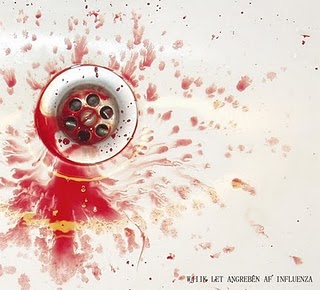 On Self Therapy, the debut LP from 20 year old German producer SCNTST, Bryan Müller smashes the fourth wall, managing to span the dark space between representation and the real thing.
On Self Therapy, the debut LP from 20 year old German producer SCNTST, Bryan Müller smashes the fourth wall, managing to span the dark space between representation and the real thing.
SCNTST’s productions are a love song: a love song to video games and machines, as well as real life, real romance. On one hand, SCNTST’s music is the most badass menu music you’ve ever heard in yr life, and in the other mitten, it’s the most banging, thudding techno you’ve ever heard in yr life.
First and foremost, Self Therapy is by and for people that love electronic music – people that love the sounds of synths; the placement of sounds; a solid, stately beat. It’s music for ravers, and for gamer introverts, and for beatheads. To be an electronic enthusiast in this day and age means you take inspiration from all over, listening to instrumental hip-hop mixtapes to Detroit techno DJ mixes, to late-nite ’80s infomercials. SCNTST’s most vital introduction to the canon is highlighting a previously unheard thread between Carl Craig, J Dilla and DJ Shadow. SCNTST accomplishes this by how he chooses and connects his beats and machines.The joy of this is that in listening to Self Therapy, a bunch of previously disparate styles are rubbing shoulders and conversing. The techno enthusiasts could take a lesson in the warmth and the groove of analogue machinery and downsampled grit, while the beat heads broaden their ears and let the machines talk, loosening things beyond the tight bands of Trap music. Self Therapy helps all of us get to know each other a little better, what our motivations are, gets us to broaden our playlists and our horizons.
SCNTST has apparently only been to a club one time, and didn’t much care for it. His motivation, then, must be for different reasons. To me, it seems pure. The pure joy of sculpting sound, of making the scenes you see in yr head, the worlds you want to inhabit. Sometimes it’s like driving through the Castlevania night, by the light of the full, blue moon, while white slanting rain cuts across the blackness, with yr true love shivering by yr side (“Kid Adventure”). Other times it’s like driving through a pixellated Vegas Strip with yr 12″s kicking and yr homies in the backseat (“Wavez Change”). Sometimes it’s like a Pokemon going native, Blade Runner meets Heart Of Darkness with plastic synths twittering like colourful birds, while videos of Koto drummers hang from the trees (“Loqul”). It’s music for screens, from watching screens, and the producer speaks with screen language, to express something timeless and human.Then the screen breaks, and we are thrust into real life, into the sweat and muscle of the club. Because this music is not detached or disassociated. When Müller does techno, he storms, like when the beat drops of “Loqul”, turning the Disney tropicalia into a powerful, greased piston. If Müller is not going to the club, his music definitely should. I want to see crowds pulverized by these constructions.
This record is mostly gonna appeal to synth heads and club fiends, as Self Therapy is rather long and strikes out across many disparate styles. It music for the devoted, that aren’t afraid of shifting style or tempo. It might throw the DJs, and it should – the adventurous and the creative should definitely work this into their sets. SCNTST will thrill those who have been grooving on Daniel Avery‘s Drone Logic recently, which has done a lot of admirers of this kind of digitized machine funk. People that love the slick, eclectic collage of Gaslamp Killer, or even the futuristic hip-hop of Flying Lotus, will also find something to impress. SCNTST is full of ideas and creativity. Basically, there is something on here for every mixtape.
Every element of Self Therapy seems polished, placed and positioned, carefully handpicked by the producer. Raw analogue machine funk meets sculpted and dissected digital collage, finally realizing an alchemical marriage between the human feel and the precision of the grid. You can sense SCNTST’s fingers on the filters, revelling in the arpeggiators.It’s like Müller is crying out from the void of the Simulacrum, in a bustling neon-lit faceless mall, crying out and shattering the illusion. Suddenly, you are back in yr bedroom, chilling with yr friends, or actually driving through the night-time, with a real girl or guy. He’s not ashamed to be young and impressed; he’s not ashamed of making it up as he goes along. He is coming from somewhere, and he is going somewhere. He speaks to the epic possibilities of the three note rap piano solo to build stately sculptures of baroque grandeur. He’s saying, “We’re here. Yr not gonna believe what we can do.”
-J Simpson-



